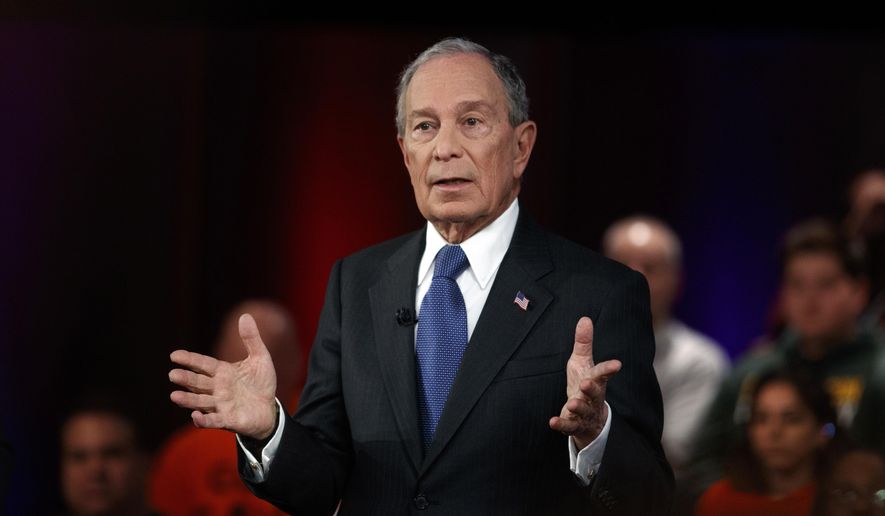Former New York Mayor Michael Bloomberg offered to pour millions of dollars into the Philadelphia election office to pay for poll workers and other election-related expenses during the 2020 election, new emails reveal.
The offer from Mr. Bloomberg, a news media and financial services mogul who ranks among the richest men in the world, was arranged through an intermediary — Stanford Law School professor Nathaniel Persily, according to the emails. At the time, Mr. Persily was co-director of the Stanford-MIT Healthy Elections Project, which worked with local officials to help them carry out the 2020 elections amid the challenges of the COVID-19 pandemic. He asked Philadelphia officials to provide a list of funding they needed to carry out the election.
In emails obtained by nonprofit research and news outlet Broad and Liberty, Philadelphia Deputy Commissioner Nick Custodio told Mr. Persily in an August 2020 email that the city could use an additional $3,074,900 from Mr. Bloomberg to run the upcoming presidential election.
The money was requested after Philadelphia officials had already made a $10 million grant request, which it eventually received, from the Center for Tech and Civic Life. The CTCL was a repository for millions in funding from anonymous donors and Facebook CEO Mark Zuckerberg aimed at helping facilitate the 2020 elections. The money was heavily distributed in Democratic strongholds.
The $10 million grant from CTCL nearly double Philadelphia’s election budget that year.
The city ultimately did not receive the $3 million from Mr. Bloomberg, Mr. Custodio said Tuesday.
“We explored every opportunity to save Philadelphia taxpayers money and provide them with the greatest service,” Mr. Custodio told The Washington Times. “We will not be commenting further.”
Mr. Bloomberg’s offer to help Philadelphia was in addition to the unprecedented private funding of the 2020 elections that has drawn scrutiny because, critics have calculated, most of the money was spent in Democratic districts in swing states, including Pennsylvania. The spending was intended to turn out voters and contributed to a record turnout that critics say helped President Biden win.
Mr. Biden beat former President Donald Trump in Pennsylvania by a little more than 1 percent of the vote.
Mr. Zuckerberg poured $350 million into the CTCL to help state and local officials administer the 2020 election. The nonprofit group also distributed millions in anonymously funded grants to election officials in key counties and cities nationwide, including Pennsylvania and Wisconsin, before Mr. Zuckerberg’s public gift.
Pennsylvania is among several states that have recently banned the use of third-party grants in elections.
“Regardless of how noble or nonpartisan this funding attempt by Mr. Bloomberg was, it illustrates the kind of influence Pennsylvania lawmakers were concerned about when they passed a bill earlier this year that outlawed private money given to election offices in the commonwealth,” said Todd Shepherd, an investigative reporter for Broad and Liberty who has been tracking the 2020 private funding trail.
Neither Mr. Bloomberg nor Mr. Persily responded to requests for comment.
Much has been written about Mr. Bloomberg’s attempts to influence politics with his wealth. The three-term mayor is worth an estimated $60 billion. He unsuccessfully sought the Democratic nomination for president in 2020 and gave away $3.3 billion ahead of his failed bid for the White House.
“His tactical philanthropy gives Bloomberg the unique capacity to influence the decision-making of the institutions that are traditional power brokers and opinion makers in Democratic politics,” Vanessa Williamson, a government studies senior fellow at the Brookings Institute, wrote in 2020. “As Bloomberg knows well from his stint as mayor, big-money ‘charity’ is an imposition of the giver’s political will.”
Mr. Bloomberg dropped out of the presidential race in March of 2020 and immediately endorsed Mr. Biden.
Mr. Shepherd said Mr. Bloomberg’s offer to Philadelphia, which came five months after he quit the presidential race “illustrates how masterful Michael Bloomberg is at using his money to influence political outcomes he wants, all while keeping that influence completely out of public view.”
The emails between Mr. Custodio and Mr. Persily also highlighted the close connection between the CTCL and the Center for Secure and Modern Elections, a liberal elections advocacy group that receives its funding from the left-leaning New Venture Fund.
The Center for Secure and Modern Elections advocates for automatic voter registration and other steps to expand voter access.
While little public disclosure exists about the relationship between the CSME and the CTCL in disbursing private election funding in 2020, Mr. Persily informed Mr. Custodio in an email that the two groups were working together to provide the election grants.
• Susan Ferrechio can be reached at sferrechio@washingtontimes.com.




Please read our comment policy before commenting.